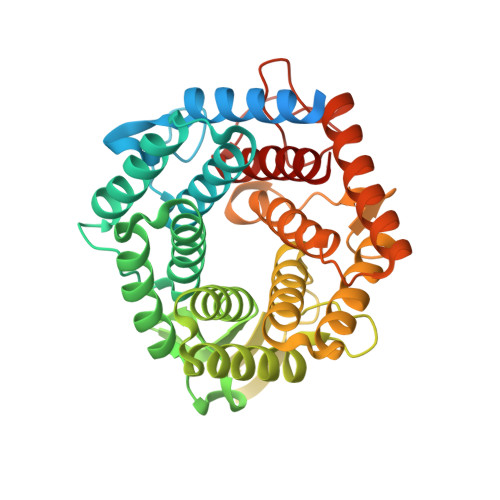Glycoside hydrolase from the GH76 family indicates that marine Salegentibacter sp. Hel_I_6 consumes alpha-mannan from fungi.
Solanki, V., Kruger, K., Crawford, C.J., Pardo-Vargas, A., Danglad-Flores, J., Hoang, K.L.M., Klassen, L., Abbott, D.W., Seeberger, P.H., Amann, R.I., Teeling, H., Hehemann, J.H.(2022) ISME J
- PubMed: 35414716
- DOI: https://doi.org/10.1038/s41396-022-01223-w
- Primary Citation of Related Structures:
6SHD, 6SHM, 6Y8F - PubMed Abstract:
Microbial glycan degradation is essential to global carbon cycling. The marine bacterium Salegentibacter sp. Hel_I_6 (Bacteroidota) isolated from seawater off Helgoland island (North Sea) contains an α-mannan inducible gene cluster with a GH76 family endo-α-1,6-mannanase (ShGH76). This cluster is related to genetic loci employed by human gut bacteria to digest fungal α-mannan. Metagenomes from the Hel_I_6 isolation site revealed increasing GH76 gene frequencies in free-living bacteria during microalgae blooms, suggesting degradation of α-1,6-mannans from fungi. Recombinant ShGH76 protein activity assays with yeast α-mannan and synthetic oligomannans showed endo-α-1,6-mannanase activity. Resolved structures of apo-ShGH76 (2.0 Å) and of mutants co-crystalized with fungal mannan-mimicking α-1,6-mannotetrose (1.90 Å) and α-1,6-mannotriose (1.47 Å) retained the canonical (α/α) 6 fold, despite low identities with sequences of known GH76 structures (GH76s from gut bacteria: <27%). The apo-form active site differed from those known from gut bacteria, and co-crystallizations revealed a kinked oligomannan conformation. Co-crystallizations also revealed precise molecular-scale interactions of ShGH76 with fungal mannan-mimicking oligomannans, indicating adaptation to this particular type of substrate. Our data hence suggest presence of yet unknown fungal α-1,6-mannans in marine ecosystems, in particular during microalgal blooms.
- Max Planck Institute for Marine Microbiology, Celsiusstraße 1, 28359, Bremen, Germany.
Organizational Affiliation:
















